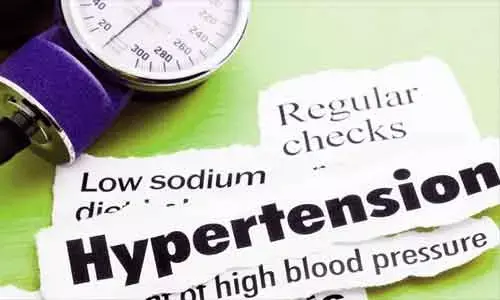- Home
- Medical news & Guidelines
- Anesthesiology
- Cardiology and CTVS
- Critical Care
- Dentistry
- Dermatology
- Diabetes and Endocrinology
- ENT
- Gastroenterology
- Medicine
- Nephrology
- Neurology
- Obstretics-Gynaecology
- Oncology
- Ophthalmology
- Orthopaedics
- Pediatrics-Neonatology
- Psychiatry
- Pulmonology
- Radiology
- Surgery
- Urology
- Laboratory Medicine
- Diet
- Nursing
- Paramedical
- Physiotherapy
- Health news
- Fact Check
- Bone Health Fact Check
- Brain Health Fact Check
- Cancer Related Fact Check
- Child Care Fact Check
- Dental and oral health fact check
- Diabetes and metabolic health fact check
- Diet and Nutrition Fact Check
- Eye and ENT Care Fact Check
- Fitness fact check
- Gut health fact check
- Heart health fact check
- Kidney health fact check
- Medical education fact check
- Men's health fact check
- Respiratory fact check
- Skin and hair care fact check
- Vaccine and Immunization fact check
- Women's health fact check
- AYUSH
- State News
- Andaman and Nicobar Islands
- Andhra Pradesh
- Arunachal Pradesh
- Assam
- Bihar
- Chandigarh
- Chattisgarh
- Dadra and Nagar Haveli
- Daman and Diu
- Delhi
- Goa
- Gujarat
- Haryana
- Himachal Pradesh
- Jammu & Kashmir
- Jharkhand
- Karnataka
- Kerala
- Ladakh
- Lakshadweep
- Madhya Pradesh
- Maharashtra
- Manipur
- Meghalaya
- Mizoram
- Nagaland
- Odisha
- Puducherry
- Punjab
- Rajasthan
- Sikkim
- Tamil Nadu
- Telangana
- Tripura
- Uttar Pradesh
- Uttrakhand
- West Bengal
- Medical Education
- Industry
Intensive BP control adds life up to 3 years in high CV risk patients: JAMA Cardiology

Results of a study published in JAMA Cardiology report that having a blood pressure target of less than 120 mm Hg -- rather than the standard 140 mm Hg -- can add six months to three years to a person's lifetime, depending upon how old they are when they begin intensive blood pressure control.
Boston: High blood pressure (BP) is a leading contributor to premature mortality worldwide. The Systolic Blood Pressure Intervention Trial (SPRINT) demonstrated a 27% reduction in all-cause death with intensive (vs standard) BP control.
Researchers at Brigham and Women's Hospital in a landmark trial found how aggressively lowering blood pressure levels can extend a person's life expectancy. They report that having a blood pressure target of less than 120 mm Hg -- rather than the standard 140 mm Hg -- can add six months to three years to a person's lifetime, depending upon how old they are when they begin intensive blood pressure control. Results are published in JAMA Cardiology.
Read Also: Higher blood levels of amyloid-beta key indicator of CVD: JACC
"When physicians discuss optimizing blood pressure, patients often wonder what benefits they may anticipate with intensive blood pressure control," said lead author Muthiah Vaduganathan, MD, MPH, a cardiologist at the Brigham. "That was the inspiration for our work: We've taken the data and reframed it to contextualize the results in a way that's most meaningful to patients."
Vaduganathan and colleagues used age-based methods to conduct their analysis. These methods are frequently used in other fields -- for instance, when projecting the long-term survival benefits of a new cancer drug -- but have not been commonly applied in studying the cardiovascular disease.
By applying age-based methods to the data from SPRINT, the team could estimate the long-term benefits of intensive blood pressure control. The SPRINT study enrolled more than 9,000 adults who were 50 years or older, were at high cardiovascular risk but did not have diabetes, and had systolic blood pressure between 130- and 180-mm Hg (130 mm Hg or higher is considered high blood pressure). Participants were randomized to intensive (at least 120 mm Hg) or standard (at least 140 mm Hg) systolic blood pressure targets. Participants were given antihypertensive therapies, free of cost, to achieve their blood pressure targets and were followed for an average of a little over three years.
Vaduganathan and colleagues estimated that if people had continued taking their antihypertensive therapies for the remainder of their lives, those with the intensive blood pressure target could add six months to three years to their life expectancy, compared to those with the standard blood pressure target. This span depended upon the person's age -- for someone who began antihypertensive medications at 50 years old, they predicted a difference of 2.9 years; for someone 65 years old, a difference of 1.1 years; and for someone 80 years old, a difference of nine months.
Read Also:What causes salt-sensitive hypertension? Study throws light
The authors note that the analysis did not account for potential risks, including kidney injury and low blood pressure, that are associated with intensive blood pressure control. Estimates of survival benefits must be carefully weighed against these potential risks in the selection of blood pressure targets for individual patients.
"Our hope is that these findings offer a more easily communicated message when discussing the potential benefits and risks of sustained blood pressure control over time," said Vaduganathan. "These statistics about life expectancy may be more tangible and personalized for patients and more relatable when making these decisions."
For further reference please log on to:http://dx.doi.org/10.1001/jamacardio.2019.6192
Dr Kamal Kant Kohli-MBBS, DTCD- a chest specialist with more than 30 years of practice and a flair for writing clinical articles, Dr Kamal Kant Kohli joined Medical Dialogues as a Chief Editor of Medical News. Besides writing articles, as an editor, he proofreads and verifies all the medical content published on Medical Dialogues including those coming from journals, studies,medical conferences,guidelines etc. Email: drkohli@medicaldialogues.in. Contact no. 011-43720751


